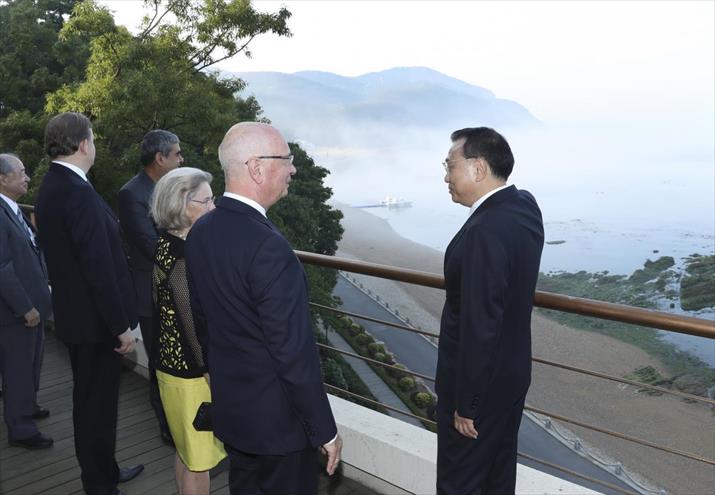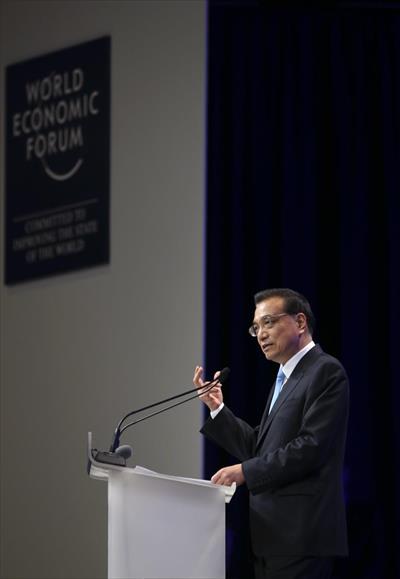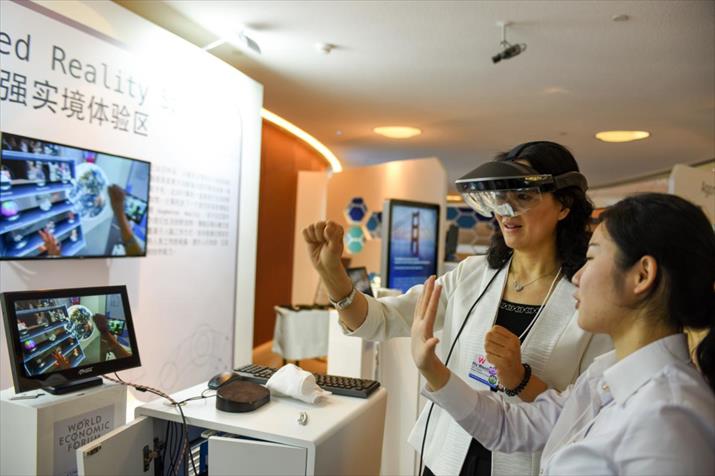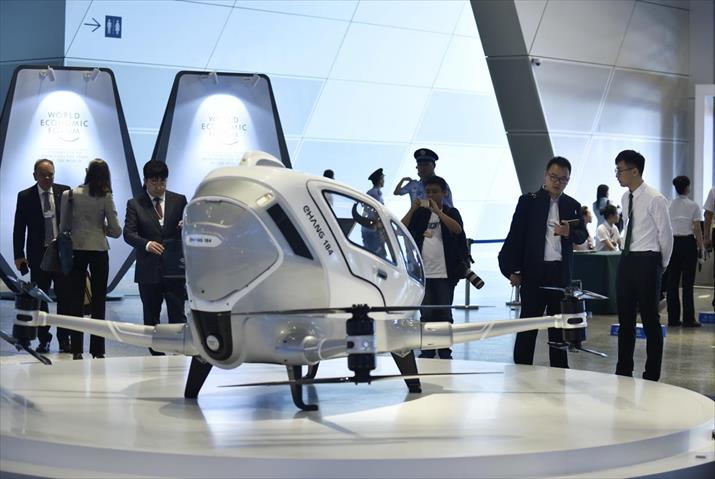| Business |
| Seek Technological Revolution | |
| The Summer Davos focuses on the path to inclusive growth | |
|
|
|
|
|
 Chinese Premier Li Keqiang (right) talks to Klaus Schwab (second right), Founder and Executive Chairman of the World Economic Forum, before the Annual Meeting of the New Champions 2017, or Summer Davos, in the city of Dalian, northeast China's Liaoning Province, June 26 (PANG XINGLEI, XINHUA)
Although the theme of the 2017 Summer Davos, or the 11th Annual Meeting of the New Champions, focused on Achieving Inclusive Growth in the Fourth Industrial Revolution, it was more than a discussion on science and technology. "It's a dialogue of human values," said Jean Liu, President of Xiaoju Science and Technology Ltd. which owns the Chinese leading ride-hailing app Didi Chuxing. She was one of the co-chairs of the forum held on June 27-29 in Dalian, northeast China's Liaoning Province. The rapid development of artificial intelligence (AI) has triggered numerous debates on the impact of technology on humans. At the same time, the world has also witnessed breakthroughs in the fields of advanced robotics, drones, virtual, augmented and mixed reality systems, as well as biotechnology, new materials and so on. All of this contributes to the creation of the Fourth Industrial Revolution that is founded on the digital technologies from the Third Industrial Revolution, according to the report Advancing Human-Centered Economic Progress in the Fourth Industrial Revolution published by the World Economic Forum on June 22. "The technological changes that we've seen coming are exponential in their development. We really have the risk of creating more disunity, displacing jobs, creating more polarization and division within society," David Aikman, Chief Representative Officer with World Economic Forum Representative Office, told Beijing Review. "The challenge for the earth that we want to discuss in Dalian is how we can make technology more human-centered, how we can include the individual and our society as a part of that technology and find ways to use technology to create a more inclusive society." At the event, Chinese Premier Li Keqiang said that the world can make use of growing stability amid innovation and change to defeat uncertainty as long as a firm and indomitable spirit is maintained. "The industrial revolution is giving birth to new industries, business models and technologies. Never before have we human beings been presented with so many opportunities for development," said Li, addressing the opening ceremony. Employment has been a top priority for China as the basis of inclusive growth. The Chinese labor force is composed of over 900 million people, with 13 million graduates added annually and a large number of rural workers transferring to larger cities, Li said. "For a country with a population of more than 1.3 billion, maintaining relatively full employment contributes to inclusive growth. To create new industries which can generate more jobs, we need to have more people involved in mass entrepreneurship and innovation," Li highlighted.  Chinese Premier Li Keqiang addresses the opening ceremony of the Annual Meeting of the New Champions 2017, or Summer Davos, in Dalian, northeast China's Liaoning Province, June 27 (LIU ZHEN, CHINA NEWS SERVICE)
Pioneering sharing economy In Japan, 120 million people own 80 million cars, making the country a huge parking lot on weekends, claimed Jean Liu in a conversation with Professor Xue Lan, Dean of the School of Public Policy and Management in Tsinghua University, in a parallel session of the 2017 Summer Davos. "Although we encourage people to take public transportation, their real needs are individually varied. How can the overall situation be balanced with personal demands? How can top-level strategies be designed through inclusive thinking?" Liu questioned. The sharing economy has become increasingly popular in China, as more and more people seek to make their lives easier and save resources, creating large numbers of jobs. It has become part of Chinese people's lifestyles ever since the car-sharing service started flourishing in recent years. "There could be a special car designed exclusively for car-sharing services in the future with independent spaces for each seat—probably with an exclusive door for each passenger," Liu said. "We think this could motivate more people to share a car with other people." "The transportation 3.0 era has come," Liu said. She noted that there will be three main changes in the future of the industry—the super car-sharing, intelligent driving and AI will completely solve the problem of traffic congestion; the intelligent driving will massively lower the accident rate; and the use of electric vehicles will make tail gas disappear. Meanwhile, bike-sharing businesses also provide solutions. "Bike-sharing not only alleviates congestion but also changes city residents' means of transportation," said Dai Wei, Founder and CEO of Ofo, a bike-sharing service provider. From the point of regulatory authorities, adapting to these new trends is also a challenge. "There are some uncertainties when new technologies or business models appear. If they were to be regulated in a traditional way, they would be easily restricted. There is a global trend of adaptive governance which addresses possible risks on the basis of creating an inclusive environment as a priority," Xue said. The State Council, China's cabinet, announced a decision to facilitate the healthy development of the sharing economy. According to a State Council executive meeting chaired by Premier Li on June 21, entrepreneurs are encouraged to explore the sharing economy, while the authorities should adjust administrative approval and business registration procedures in accordance with new business models. "The Chinese Government is the first to legalize the car-hailing service in the world. It's a great step," Liu said. "However, the concept of trip-sharing is still fresh and changing—if the regulator can have a more inclusive attitude and perception of sharing economy, that will be better."  A visitor wears a helmet to experience augmented reality at the 2017 Summer Davos in Dalian, Liaoning Province, on June 27, 2017 (XINHUA)
Clean tech functioning "With a smartphone in hand, you can find a bike anywhere in Beijing," said Wan Gang, Minister of Science and Technology, in a session of the forum on June 27. "Two decades ago, China was seen as a kingdom of bicycles, which possibly suggested that China was undeveloped. But today's bicycles are embedded with different hi-tech devices, including satellite navigation, wireless payment, big data and cloud computing," Wan said. Bikes and electric cars represent a green lifestyle, and they are related to the clean technology revolution, Wan noted. Electric car sales in China totaled 507,000 in 2016, the highest in the world. Still, regarding the development of electric cars, battery charging is a paramount issue. "The State Grid is trying to solve this problem," said Shu Yinbiao, Chairman of China's State Grid Corp., a Fortune 500 company and one of China's biggest employers. The development of electric cars is a big step in clean technology since globally over 20 percent of energy is consumed in the transportation sector, he added. The State Grid has established an online platform of electric cars in which charging piles and cars are monitored in real time. Since the data can be shared among different charging piles, emergencies can be solved rapidly based on the car's specific problems. Currently, 160,000 charging piles and 1 million electric cars in 95 cities from 13 provinces are involved in the project. Energy will play a pivotal role in the Fourth Industrial Revolution. The transformation covers shifts in production, consumption, technique and management systems, said Shu, who is also one of the co-chairs of this year's Summer Davos. "It is fair to say that we are leading in clean technology development," Wan said. "Technology innovation goes hand in hand with innovation of institutional arrangements." Investment in innovation is a crucial factor in driving growth, he asserted while emphasizing the need for more flexible policies. China aspires to change its traditional energy mix so that renewable energy could account for 50 percent or more of the total consumption. Beijing closed its last coal-fired power plant in March. The Beijing-Tianjin-Hebei region will not need coal for heating by the end of the year. The Belt and Road Initiative will contribute to international cooperation in this regard, fostering the flow of clean technologies between borders. That is a common and global objective, in line with the United Nation's 2030 Sustainable Development Goals, and governments should build the legal frameworks to encourage the adoption of clean energy. "China has an opportunity to lead," said Alex Molinaroli, Chairman and CEO of Johnson Controls, a global diversified technology and multi-industrial leader. He believes China could "move from an importer of technologies to a developer of technologies for the rest of the world."  Visitors look at a passenger drone at the 2017 Summer Davos in Dalian, Liaoning Province, on June 27, 2017 (XINHUA)
The future ahead Li Daokui, Dean of the Schwarzman College with Tsinghua University, said the China-proposed Belt and Road Initiative is more of a bottom-up linkup of countries' needs than a top-down policy. "China proposed the Belt and Road Initiative against the backdrop of being the world's largest manufacturing nation for years," Li said at a session of this year's Summer Davos. "The initiative itself is an innovation, which does not have a so-called 'blueprint.' All countries involved could express their thoughts and needs, and then talk about cooperation. That's the biggest charm of this open-style initiative." China endeavors to adapt to the latest global technology and industrial revolution, push forward the sharing economy, strive for optimal allocation of resources, reduce overcapacity and foster growth momentum, according to the State Council executive meeting chaired by Premier Li. Li also mentioned in his speech at the 2017 Summer Davos that China will further expand market access in the service and manufacturing sectors, relax restrictions on foreign ownership, and treat domestic and foreign companies on an equal basis. China's adaptive governance is welcomed by business leaders. More than 90 percent of Chinese CEOs are confident in the growth outlook of their companies, a higher percentage than their global counterparts, according to a KPMG CEO survey, titled 2017 China CEO Outlook—Disrupt and Grow, published on June 27. The survey gathered responses from 1,261 CEOs worldwide, including 125 from China. It shows that over the next three years, two-thirds of Chinese CEOs are predicting top-line growth of 2 percent or more, while over the next year, 97 percent plan to increase their headcount, both ahead of their global peers. KPMG China Chairman Benny Liu said that China's restructuring process and increasingly sophisticated consumers are leading to both challenges and opportunities. CEOs are responding to this by embracing technological disruption to innovate their production and distribution models, as well as to create new products. "The Chinese CEOs I'm speaking with are committed to globalization, and recognize the need to highlight the positive impacts it brings. Together we need to ensure that different countries, different social strata and different groups of people all share in the benefits. They see practical steps such as the Belt and Road Initiative as critical to delivering those benefits," Liu said at a press conference during the 2017 Summer Davos. According to Premier Li, the Chinese economy has a better structure—economic growth is transforming from investment- and export-driven to consumption-driven, with consumption contributing 64.6 percent to growth last year. The vast and fast-growing consumer market presents plenty of opportunities for foreign businesses. "The process of China's continued reform and opening up needs participation from foreign capital, foreign businesspersons and foreign wisdom," Li said at the 2017 Summer Davos. "We welcome foreign businesses to carry out mergers, acquisitions and reorganizations in China. China will further expand market access for them, apply the negative list approach and treat them the same way as domestic firms." (Reporting from Dalian, Liaoning Province)
The Fourth Industrial Revolution The Fourth Industrial Revolution is a "mental model" for understanding and influencing the way in which emerging technologies are changing how value is created, exchanged and distributed across economic and social systems. Since 1750, when mechanization first transformed the textile industry in Britain before spreading to other industries and countries, three major and disruptive periods of technological advancement have changed our methods of production, communication, transport, agriculture and our social systems. The First Industrial Revolution saw the widespread use of steam, the introduction of the factory system, the development of the railroad and huge advances in metallurgy and chemistry. The Second Industrial Revolution, which took place roughly between 1870 and 1914, led to the development of electricity networks, the telephone, the automobile, the gas turbine, artificial fertilizer and other technologies that once again changed how people moved, communicated, consumed and saw the world. The Third Industrial Revolution took off in earnest in the 1960s and its major components were mature by the early 2000s with the spread of the Internet and mobile telephones. Based around advances in information theory, the production of silicon, the integrated circuit, microprocessor and digital telecommunications, this revolution again completely changed the world. The Fourth Industrial Revolution is enabled by the digital technologies of the third, and is represented by breakthroughs in fields as diverse as: —Artificial intelligence and machine learning —Advanced robotics and drones —Virtual, augmented and mixed reality systems —Biotechnologies and precision medicine —Multidimensional printing —New materials —Neurotechnologies —New approaches to energy generation and storage. (Source: World Economic Forum) Highlights of Chinese Premier Li Keqiang's Speech at the Summer Davos Forum The world is making continued progress against the backdrop of globalization and the round of industrial revolution is giving birth to new industries, business models and technologies. Never before have we human beings been presented with so many opportunities for development. Countries must safeguard economic globalization to achieve inclusive growth. Economic globalization has greatly facilitated the flow of goods and capital, and all countries can benefit in the course of its progress, be it developing or developed countries. The problems some countries have encountered are not because of globalization itself, but because they fail to adapt to economic globalization or address problems that come with it. We need to better steer and adapt to economic globalization, promote trade and investment liberalization and facilitation, and at the same time, reform and strengthen international trade rules to ensure equal rights, equal opportunities and equal rules for all countries in international economic cooperation. Trade disputes should be dealt with according to the different situations in different countries. Based on the principles of equal consultation, mutual understanding and accommodation, as well as equal treatment without discrimination, countries must seek convergent interests and complement each other's advantages to achieve win-win results. Neither should we impose unilateral rules on others, nor politicize fair trade. The Chinese economy has shown noticeable achievements in structural reform. New economic driving forces contributed to more than 70 percent of China's employment in 2016. China will forge ahead, with economic structural reform and with inclusive and prudent regulation in new economic forms, such as e-business and mobile payments, and economic development would be both positive and clearly defined. China will stick firmly with steady macro-economic policies, with a proactive fiscal and prudent monetary policy. China will not resort to massive stimulative measures, and maintaining steady market expectations is of critical importance. Employment has been a top priority for China as the basis of inclusive growth. China added 13 million jobs every year over the last few years, and the registered urban unemployment rate stood at about 5 percent. Employment is a key index to evaluate the broader economy. Sustaining growth is necessary for a stable job market. Mass entrepreneurship and innovation serve as an effective way to realize inclusive growth. China has achieved better-than-expected results in its efforts to drive mass entrepreneurship and innovation. The number of market entities in China increased by a daily average of 40,000 in the past three years. During that period, 14,000 enterprises were registered every day on average, with about 70 percent of them active in business, and the number of new enterprises rose to 18,000 a day on average in May this year. China will further open up to foreign investors. China will be proactive with opening up and create a business environment that is internationally competitive. China will further expand market access in the service and manufacturing sectors, relax restrictions on foreign ownership, and treat domestic and foreign companies on an equal basis. We encourage foreign capital to invest in central and western regions and the northeastern industrial base, where there is tremendous potential. Although China would applaud foreign companies to reinvest their profit in the country, there's no such restriction on capital flows. China remains one of the best investment destinations over the long term, with promising rewards. In the next five years, China will import goods worth $8 trillion. (Source: Compiled by Beijing Review) Copyedited by Bryan Michael Galvan Comments to lifangfang@bjreview.com |
|
||||||||||||||||||||||||||||
|